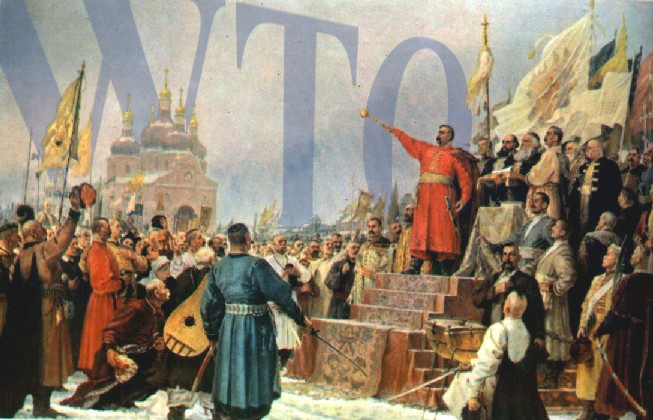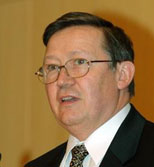|
|
Editorial:
|
|
News:
|
|
Globalisation -
– change of paradigm.
More importantly, both election campaigns were taking place while the world is going through a major economic crisis caused by threat that the U.S. dollar will fail to perform as a world reserve
currency. It is absolutely evident that this crisis and the resulting unmanaged chaos can be stopped only by close cooperation between all participants in the global economy, beginning with the
newly elected presidents. It is possible that these developments manifests a new paradigm in history characterized by increasing interdependency of different national economies and the world
becoming more and more a common habitat, where everybody succeed or everybody fail...more
|
|
March 30, 2008
Bridge-building Vladimir Putin wants tunnel to US
The 64-mile tunnel would run under the Bering Strait between Chukotka, in the Russian far east, and Alaska; the cost is estimated at Ј33 billion. Roman Abramovich, the owner of
Chelsea football club and governor of Chukotka, has invested Ј80m in the world's largest drill but so far has denied that it is linked with the development...more.
Commentary:
It
was mentioned earlier that only infrastructure projects of planetary scale can absorb the present volume of US dollars and prevent world wide economic crisis, caused by it's inability to perform as a
world reserve currency. But this kind of projects require close cooperation of US and Russia, impossible if hostility between this states will continue.
|
|
|
|
|
|
About us
|
|
Science News:
|
|
General Information
History and description of the National Institute for
Development of the Russian Academy of Sciences.
Contact Information
|
|
News of NIDRAS
Physics and mathematics
Humanities
Arts
System of education
Economics
Politics
|
|
|
|
|
|
M. Gelvanovsky
"Chrematistics" versus "Economia"
.
|
|
Competitive ability: laws of survivalI
t is important to remember that modern economic competition is a war. The only acceptable outcome is victory, since this is a matter of economic life and death for market subjects... more
|
|
|
|
|
|
Alexander Brodsky
East and West - difficulties of interpretation
|
|
 Is Byzantine
civilization source of scientific method? Is Byzantine
civilization source of scientific method?
The thrust of this article to analyze the characteristic features of Western philosophy during the modern history, that made
scientific progress possible, and how if any they appeared. What makes this work important is that the present crisis in scientific method is obvious. Indeed,
after Sir Isaac Newton published in 1687 Philosophiae Naturalis Principia Mathematica, science has been changing its paradigm of development every 50
years, and in the 20th century this cycle decreased to every 20 years. But after the flight to the moon in 1969, the scientific progress slowed and there have
been no really important discoveries in fundamental science for more than 40 years .more...
|
|
|
|
|
|
Projects of NIDRAS
|
- 1. State Strategy of National Development.
2. Competition in Global Economy
2. State Administration.
3. Social Policy.
4. Ethics and the Morals.
5. Culural Policies.
6. State Small Business Support..
7. Ecological Policies.
|
|
|
 |
|
|
|
Themes and Discussions:
|
|
 S. Glazev S. Glazev
United States and Japan to trash
US dollar
The present global economic crisis can help the Russian economy,
if the Russian Government will use its financial
instruments to the best advantage of the Russian Federation...
"This is a typical financial pyramid, supported by the US Federal Reserve's printing press. ..."
"Current situation management in the U.S. resembles the Russian government in 1998 – everybody knew
that a big crisis was coming, but nobody did anything about it. It is scary to see unrecovered mortgages
reaching $10 trillion dollars while combined U.S. debts are over $30 trillion dollars. The U.S. has cornered
itself and cannot stop. If the Fed's printings press stops, market investors will consider it as a signal to run..."
"The next step is obvious: foreign buyers should pay for Russian oil with Russian roubles. That in turn will force the USA and Europe to accept rouble as one of their reserve currencies..." more...
|
|
 S. Glazev S. Glazev
Economic development in the Russian Federation during global techno-economic restructuring.
It is characteristic to modern economic development that scientific progress and intellectual factors are playing even bigger roles in modern economics than
they did in the 20th century. In modern industrial countries, 70-85% of GNP growth can be attributed to the implementation of new intellectual products to
technology, industrial machinery, education of labor and administration.
The characteristic feature of the fifth techno-economic structure is extremely rapid development of its key
element – the computer.
The key elements of the sixth techno-economic structure can be observed even now: biotechnology (based
on molecular biology and gene engineering), nanotechnology, artificial intelligence, global information networks and integrated high-speed transport systems.
Concentrating the financial reserves derived from the export of natural resources may allow developing
countries to overcome this gap by bypassing the building of the infrastructure of the fifth techno- economic
structure and beginning to build the sixth one; however, this can happen only while the imminent transition
between techno-economic structures and corresponding crisis is taking place. For developing countries,
the only way to achieve this goal is not to follow the old trajectory of development, but to build elements key
to the coming sixth techno-economic structure and thus make new trajectories of development.... more
|
|
 Igor Burakovsky Igor Burakovsky
Russia makes its way to the WTO:
Lessons for Ukraine.
"From the very beginning Russia considered its joining the WTO as a project having the potential to enhance her national economy, while in Ukraine this
process was announced as a political priority, a designation that slowed down the process due to the fact that Ukrainian politicians are tremendously
divided — if not antagonistic; there is no consensus among them about anything, including joining the WTO....."
"The quintessence of the accusation that the Ushenko administration abandoned its position and stopped
protecting Ukrainian national interests in the WTO talks was articulated by Russian Parliament Member
Sergei Glazev in his May 23, 2005 open letter to Julia Timoshenko, who was prime minister of Ukraine at
the time. As Glazev wrote, "Ukrainian representatives accepted the conditions of their overseas partners in
WTO talks on all positions vital to the Russian and Ukrainian economies where cooperation between these
two countries was essential, thus betraying the national economic interests both of Russia and Ukraine..."
"Ukrainian politicians should learn from Russian political leaders (such as Glazev) that national interests should be a priority over internal political wrangling..." .more
|
|
 M. Gelvanovsky M. Gelvanovsky
State policies to influence prices: what should the strategy be?
Few can deny today that the sudden deregulation of prices in the Russian Federation in the early 1990s
had a very negative impact on the Russian economy. It had a disintegrating effect on the economic infrastructure, contributed to the breach of long term contracts
and caused a catastrophic decrease in agricultural and industrial production. Why? .... more
|
|
 M Gelvanovsky M Gelvanovsky
The Globalization and Reform.
Is stable development of Russia possible while market liberalization is being imposed on Russian economy?
The main purpose of this article is to facilitate interdisciplinary discussion of globalization and specifics of its development in different regions and countries of the world.
One of the main consequences of globalization today is that political, social and economic standards of life
characteristic to the United States of America and Western Europe are being propagated into the rest of the
world. This mass perpetuation problem is problematic in that it is accompanied by the more shadowy aspects of American and European mass-culture, like drugs, family disintegration and personal moral
decline, the presence of which is considered to be subnormal in traditional societies. The history and roots
of these aspects of Anglo-Saxon culture and its influence on the world requires a separate article devoted
exclusively to this subject matter and its significance to understanding the essence of modern globalization
and will not be dealt here. The present article will consider the effects, both positive and negative, of
globalization and modernization on traditional societies and whether these effects may have been planned by their originators to support their mercantile interests...more
|
|
|

